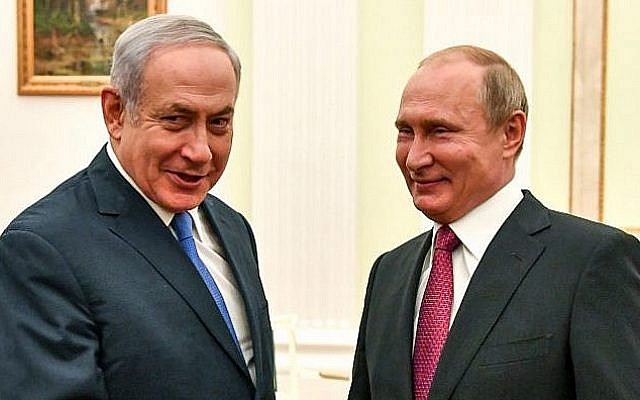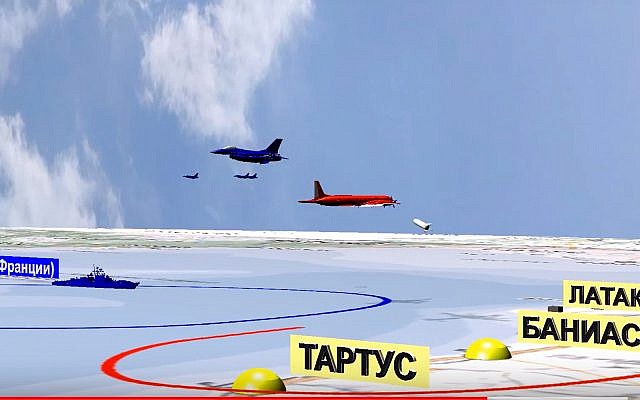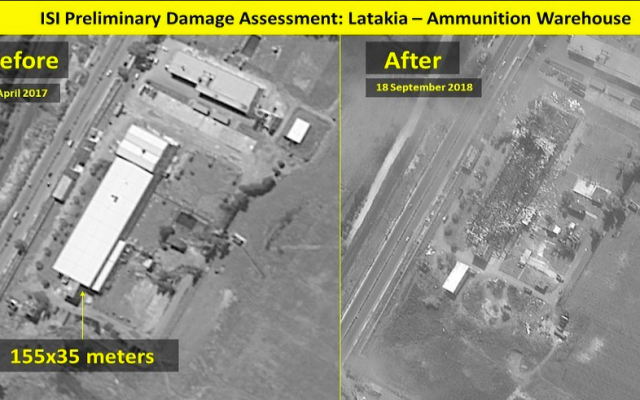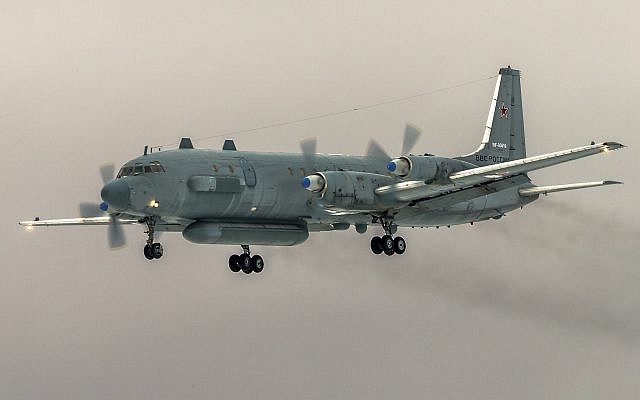‘Major mistake’: Israel, US warn Russia against giving S-300 missiles to Syria Netanyahu says move to arm Assad with advanced system within 2 weeks following downing of spy plane will ‘magnify dangers’ in region, Bolton cautions of ‘significant escalation’
Israeli security cabinet to meet Tuesday over developments
Both Jerusalem and Washington warned Russia on Monday evening against its declared intention to provide the Syrian military with advanced surface-to-air missiles within two weeks, saying the move would further destabilize the region and increase already high tensions.
Israel’s high-level security cabinet was set to meet Tuesday morning to discuss the latest developments.
Russian President Vladimir Putin informed Israeli Prime Minister Benjamin Netanyahu of the decision to provide Syria with the S-300 system in a phone call Sunday.
Get The Times of Israel’s Daily Edition by email and never miss our top stories Free Sign Up
In response, according to a statement by Netanyahu’s office, “The prime minister said providing advanced weapons systems to irresponsible actors will magnify dangers in the region, and that Israel will continue to defend itself and its interests.”
Concurrently US National Security Adviser John Bolton said Russia’s announcement was a “major mistake” that would cause a “significant escalation” of tensions. He urged Moscow to reconsider.
Channel 10 News quoted a senior American official who noted that the system could endanger US Air Force jets operating against Islamic State in Syria.
“Bringing more anti-aircraft missiles into Syria won’t solve the Syrian army’s unprofessional and indiscriminate firing of missiles and won’t mitigate the danger to aircraft flying in the area,” the unnamed official said.
Russia made the announcement following last week’s downing of a Russian plane by Syria in a friendly fire incident that killed 15 Russia soldiers. The Russian military’s reconnaissance Ilyushin Il-20 was shot down by Syrian missile defense systems responding to an Israeli airstrike.
In his call with Netanyahu, Putin said he disagreed with the Israeli version of events concerning the downing of the Russian plane.
“The information provided by the Israeli military… runs counter to conclusions of the Russian defense ministry,” the Kremlin said of the call, adding that the actions of the Israeli pilots had led to the plane being targeted by Syrian air defense systems.
“The Russian side proceeds from the fact that the actions by the Israeli air force were the main reason for the tragedy,” a statement said.
Last Tuesday, by contrast, in a previous Putin-Netanyahu call, the Russian president had absolved Israel and blamed a “chain of tragic accidental circumstances.”
Netanyahu’s office said Monday night he had “expressed his confidence in the credibility of the IDF probe and its conclusions, and stressed once again that responsibility for the unfortunate incident lay with the Syrian army that brought down the plane, and with Iran, whose aggression destabilizes [the region].”
Nevertheless, it said, Netanyahu had “once again expressed his condolences for the deaths of the Russia soldiers.”
The statement added that the two leaders agreed to “continue talks between professional teams and coordination between the armies through military channels.”
The Kremlin earlier Monday issued a devastating critique of Israel over the incident, accusing Israel’s air force of “premeditated actions,” warning the incident would harm relations between the two countries.
“According to information of our military experts, the reason (behind the downing) were premeditated actions by Israeli pilots which certainly cannot but harm our relations,” Kremlin spokesman Dmitry Peskov told journalists.
Defense Ministry spokesman Maj. Gen. Igor Konashenkov produced data collected by Russian air defense systems in Syria purportedly indicating that one of the Israeli F-16 fighter jets was flying close to the much larger Russian plane. When it was targeted by a Syrian missile it suddenly veered off, resulting in the missile homing in on the bigger target.
Konashenkov also said that data showed that the Israeli jets remained over the Mediterranean Sea off Syria’s coast after the Russian plane was downed, though Israel has said its fighters were long gone by the time the Syrian missiles were launched.
The Russian defense ministry had announced the upcoming transfer of the S-300 earlier in the day, saying Moscow would “transfer the modern S-300 air defense system to the Syrian armed forces within two weeks.”
Defense Minister Sergei Shoigu also said Russia planned to jam radars of military planes striking from off the coast of the Mediterranean — measures that would seek to complicate Israel’s ongoing efforts to prevent Iran deepening its military presence in Syria and to thwart the transfer of weapons in Syria to Hezbollah.
“In regions near Syria over the Mediterranean Sea, there will be radio-electronic suppression of satellite navigation, on-board radar systems and communication systems of military aviation attacking objects on Syrian territory,” he said.

Russia had originally agreed to sell the system to Syria in 2010, but scrapped the plan at Israel’s behest. However, the Syrian military has already received training to use the system.
“We are certain that the realization of these measures will cool the ‘hot heads’ and will keep them from poorly thought-out actions which threaten our servicemen,” Shoigu said.
Shoigu noted that Russia had intended to supply Syria with the systems in 2013, but had held back because of Israeli concerns. Now, he said, “the situation has changed, and that isn’t our fault.”
Peskov said the measures were “not directed against third countries but towards defending our own military.”
Syria’s Ambassador to Russia Riyad Haddad said following the announcement that Damascus required the S-300 “in order to defend Syrian land from Israel’s aggressive actions.”
Also Monday, Putin told Assad of Moscow’s plan to deliver the new S-300 air defense system, in the first conversation between the two leaders since the downing of the plane.
In the phone call, initiated by Assad, Putin spoke of “additional measures to ensure the safety of Russian troops in Syria and to reinforce the country’s air defense system,” the Kremlin said in a statement.
According to the Syrian president’s office, Putin told Assad the blame for the plane incident lay squarely with Israel.
“This is absurd,” said Israeli Middle East analyst Ehud Ya’ari on Monday night. “The Syrians down a Russian plane and get the prize of an advanced weapons system.”
Israeli fighter jets conducted the airstrike last Monday night on a weapons facility in the coastal city of Latakia that the IDF said was going to provide weapons to the Hezbollah terror group and other Iranian proxies. During a Syrian air defenses counterattack, the Russian spy plane was shot down by an S-200 anti-aircraft missile and its 15 crew members were killed.
Russia already has its own S-300 air defense system in Syria, along with the more advanced S-400 system.
Defense analysts have questioned whether an S-300 system in Syrian, not Russian, hands could threaten Israel’s air power in the region and prevent it from being able to conduct strikes against targets in Syria.
Earlier this year Defense Minister Avigdor Liberman downplayed Israeli concernsover Russia’s purported plans to install the system in Syria.
“One thing needs to be clear: If someone shoots at our planes, we will destroy them. It doesn’t matter if it’s an S-300 or an S-700,” he said.
Israel’s former Military Intelligence chief Amos Yadlin, who currently heads the influential Institute for National Security Studies in Tel Aviv, said he assumed the air force would work quickly to destroy the S-300, if it were indeed handed over to Syria.
“If I know the air force well, we have already made proper plans to deal with this threat. After you remove the threat, which is basically what will be done, we’re back to square one,” Yadlin told Bloomberg news in April.
Moscow announced earlier this year that it was considering reversing its longtime policy against supplying the S-300 system to the regime following a series of airstrikes against Syrian targets by the United States, United Kingdom and France in response to an alleged chemical weapons attack by Assad.
The Russian-made system, made up of radar arrays and missile launchers, offers long-range protection against both fighter jets and missiles. The system has been supplied by Moscow to Tehran, and deployed by the Russian army in Syria alongside its more advanced iteration, the S-400.
The Israeli military on Sunday entirely rejected the Russian defense ministry’s claim that it was to blame for the downing of a Russian spy plane by Syrian air defenses during an Israeli strike last week, reiterating that Syria was at fault.

In a statement, the Israel Defense Forces maintained its version of events — that the Russian reconnaissance plane was shot down as a result of indiscriminate Syrian anti-aircraft fire — and said it would continue to act to prevent terrorist groups from obtaining advanced weapons.
Earlier on Sunday, the Russian defense ministry released the findings of its investigation into the downing of the plane and the deaths of the crew. Moscow said Israel alone was responsible for the incident, accusing the IDF of failing to give notice of its attack in a timely and accurate manner, and claiming the Israeli pilots used the Russian surveillance aircraft as cover during their strike.
Nevertheless, the Israeli military said that it would continue to operate against Iran and Hezbollah in Syria and that it hoped its coordination efforts with Russia continued.
An Israel delegation that flew to Moscow last Thursday, led by IAF chief Amikam Norkin, detailed to the Russians that it gave considerable advance warning — 12 minutes according to Israeli reports — and precise information on the target area to the Russians before the strike, that its jets did not hide behind the Russian plane, and that its planes had left the area before the Syrians one of 40 anti-aircraft missiles “indiscriminately,” downing the Russian plane. Israeliofficials said on the return of the delegation that they believed their Russian hosts had accepted their version of events.
Judah Ari Gross contributed to this report.
Comments are closed.



